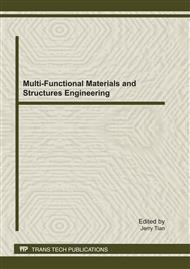[1]
CHENG Si-wei. Complex science research, Democracy and Construction press, 1999, 125-128.
Google Scholar
[2]
Lowe, Warren J. and Moran S. Discovering industrial ecology: an executive briefing and source book, Battelle press, Columbus, (1997).
Google Scholar
[3]
Holland J H. Hidden Order, Addison--Wesley, Reading, MA, (1995).
Google Scholar
[4]
WANG Yu, The CAS thought in computer modeling [D], Information school of China People University, (1996).
Google Scholar
[5]
TAN Yue-jin, DENG Hong-zhong, The research of CAS theory and application, System engineering, 19(5), pp.1-2, (2001).
Google Scholar
[6]
CHEN Yu, CAS--Theory And Its Application, System Dialectic Transaction, Vol. 9(4), pp.35-38, (2001).
Google Scholar
[7]
N. Basu, R.J. Pryor and T. Quint. ASPEN: A Microsimulation model of the economy, Computational Economics, Vol. 12, (1998).
Google Scholar
[8]
T Graedel and Braden R. Allenby, Industrial Ecology, Prentice Hall, (1999).
Google Scholar
[9]
Tesfatsion, Guest Editorial: Agent-Based Modeling of Evolutionary Economic Systems, IEEE Transaction on Evolutionary Computation, Vol. 5, (2001).
DOI: 10.1109/tevc.2001.956708
Google Scholar
[10]
Holland J. H. Genetic Algorithms, Scientific American, Vol. 9(7), pp.44-50, (1992).
Google Scholar
[11]
Teodorovic D. Transport Modeling by Multi-Agent Systems: A Swarm Intelligence Approach, Transportation Planning and Technology, Vol. 26(4), pp.289-3129, (2003).
DOI: 10.1080/0308106032000154593
Google Scholar
[12]
Qi D, Sun R. A multi-Agent system integrating reinforcement learning, bidding and genetic algorithms, Web Intelligence and Agent Systems, An international journal, Vol. 1, 187-202, p. (2003).
DOI: 10.1109/iat.2003.1241048
Google Scholar
[13]
Meo P D, Mbale J, et al. XICOMASQ: An XML-based Information Content Oriented Multi-Agent System for QoS management in telecommunications networks, Web Intelligence and Agent Systems, An international journal, Vol. 2, 55-70, (2004).
DOI: 10.1109/iat.2003.1241054
Google Scholar


